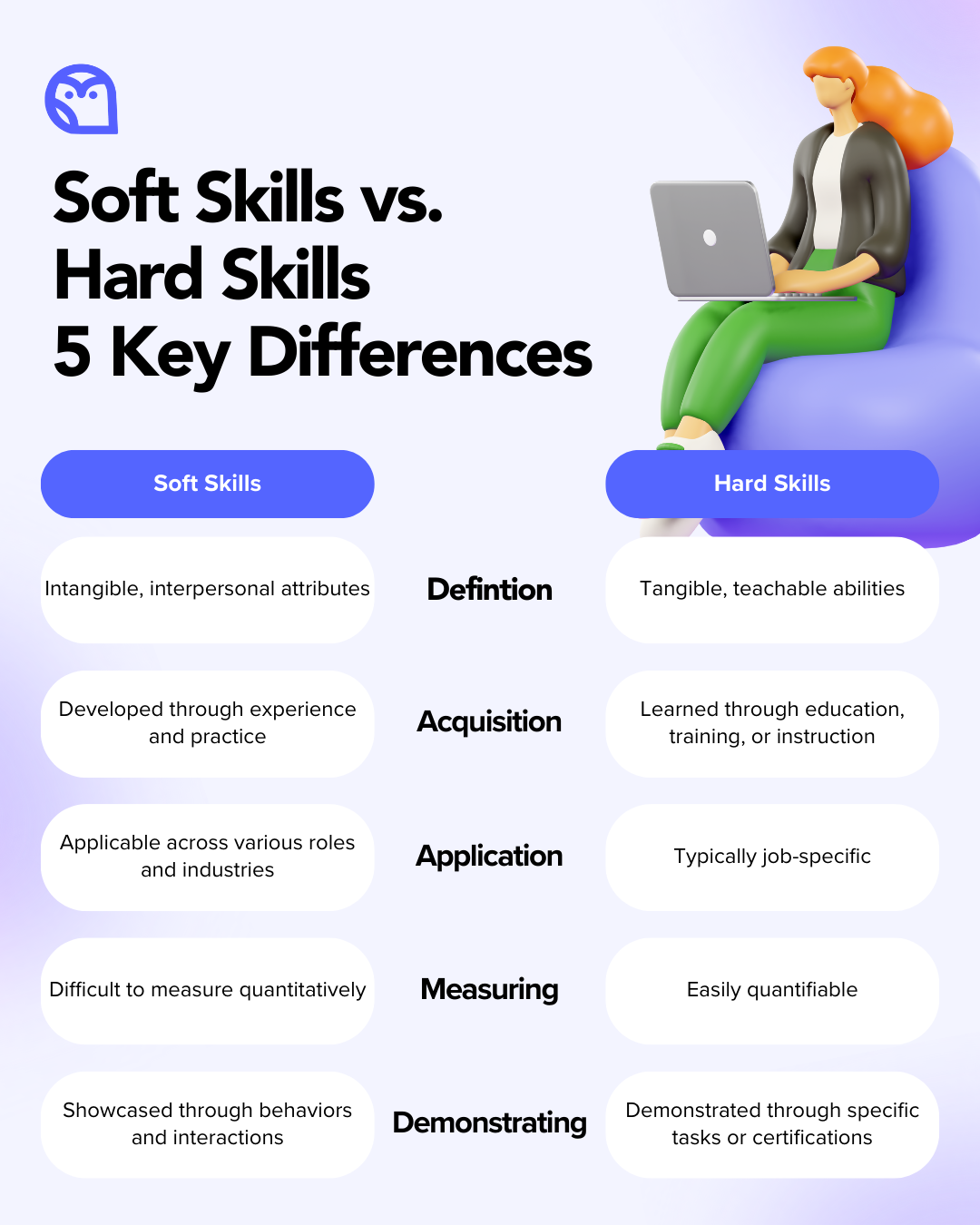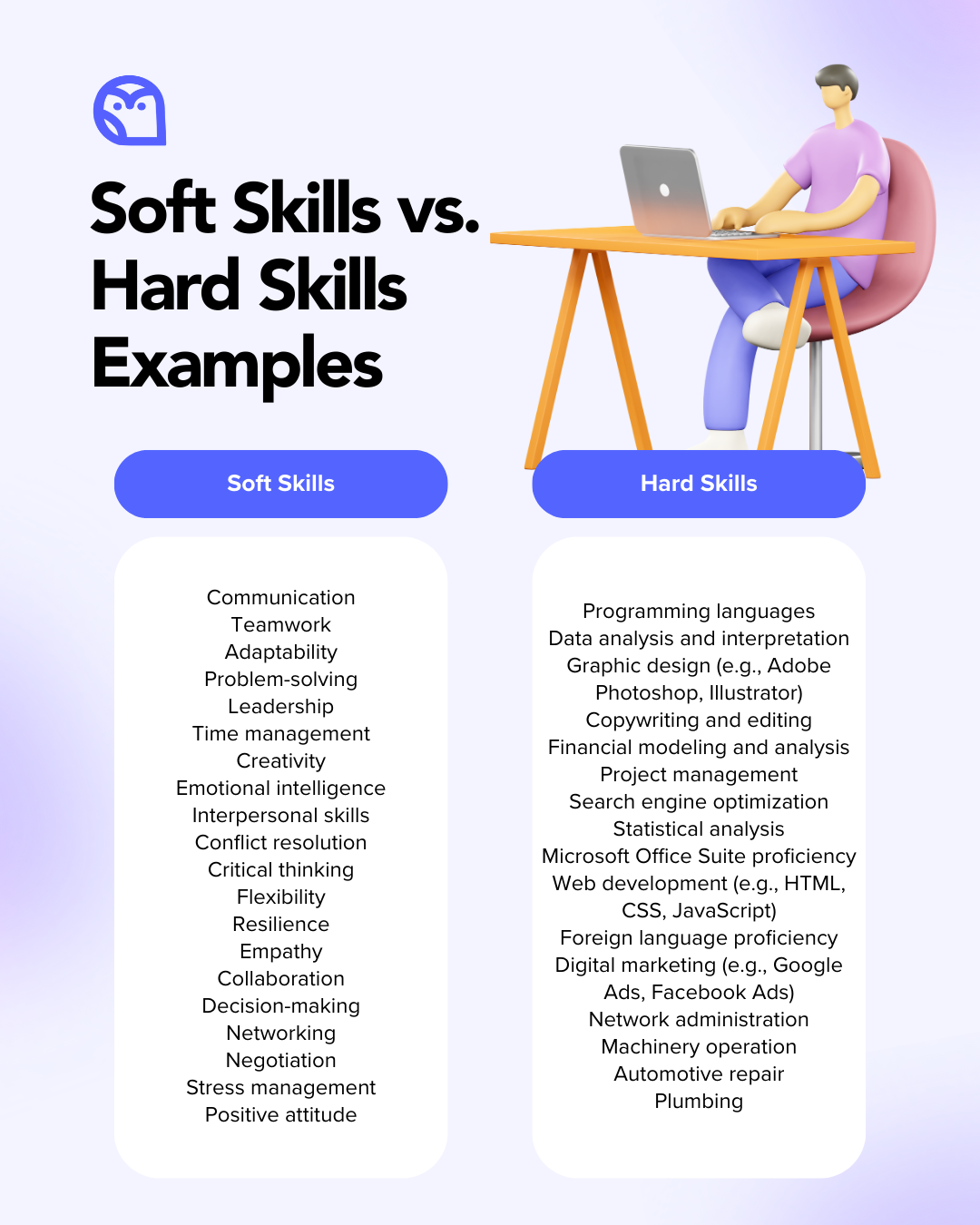Resumes are your ticket to showcasing your abilities and experiences to potential employers. A crucial part of this is highlighting the skills that make you a perfect fit for the job.
But not all skills are the same! You can break down your abilities into two categories: soft skills and hard skills.
Soft skills are all about how you work with others and handle different situations. They include communication, teamwork, adaptability, problem-solving, and leadership. On the other hand, hard skills are specific skills you’ve learned through education or experience, like coding, marketing analytics, or engineering design.
Both types of skills are essential, but how you approach them when applying to jobs will be a little different.

Soft skills definition
Soft skills encompass a wide range of interpersonal abilities and personal attributes that aren’t necessarily taught in a classroom.
These skills—like communication, teamwork, and leadership—are crucial for thriving in the professional world. In fact, according to a study by the Carnegie Mellon Foundation and Stanford Research Institute, 75% of long-term job success depends on soft skills!
Soft skills aren’t typically industry- or role-specific. Most employers seek them out, which makes them highly transferable. If you develop them, you can take them with you and use them in any job— even if you switch career paths to something totally different.
Hard skills definition
Hard skills are the building blocks of expertise. They are the concrete skills and knowledge that you can learn, practice, and measure. They’re the technical abilities you acquire through training, education, and hands-on experience.
Unlike soft skills, hard skills are typically job or industry-specific. The hard skills that one profession requires will be much different from what another calls for. For example, if you started your career as a software engineer, your knowledge of programming languages will probably not be directly applicable if you switch to the nursing field.

Soft skills vs. hard skills examples
While both types of skills are valuable, they serve distinct purposes and contribute differently to professional success.
Let’s look at some more examples.
Soft skills examples
Soft skills deal with how you interact with others and navigate the world around you.
Effective communication, for instance, is the cornerstone of successful relationships and collaborations. It enables individuals to convey ideas clearly, actively listen, and empathize with others’ perspectives.
Similarly, teamwork is a soft skill that allows you to collaborate toward shared goals. It requires mutual respect, effective communication, and a willingness to leverage diverse perspectives and strengths within a group dynamic.
Adaptability is also a crucial soft skill, empowering individuals to navigate change with flexibility, creativity, and resilience. Adaptability allows you to embrace new challenges and adjust your priorities.
Soft skills like these collectively foster productivity, growth, and positive relationships in the workplace.
Hard skills examples
For example, if you’re a software developer, your hard skills might include coding languages like Python, Java, or HTML.
If you’re in the healthcare industry, hard skills might involve medical procedures, diagnostic techniques, or specialized equipment operation. Doctors need to know how to perform surgeries, nurses need to know how to administer medication, and technicians need to know how to operate medical devices safely and accurately.
Even in fields like marketing, finance, or engineering, hard skills play a crucial role. Marketers need to understand analytics tools and social media platforms, finance professionals need to be proficient in financial modeling and analysis, and engineers need to master CAD software and technical drawing.
Unlike soft skills, hard skills are tangible and quantifiable. You either have the knowledge or do not, and somebody could theoretically measure your level of expertise.
Soft skills vs. hard skills on your resume
These two types of skills also differ in how you approach them on your resume.
Including soft skills on your resume
There are two ways to include soft skills on your resume. Option one is to simply list the quality in your resume skills section. The second option, which is the more effective method, is to work the skills into your work experience bullet points.
Incorporating them into your work experience is more impactful, as it shows how you embody those skills. It’s all about proving that you can walk the walk, not just talk the talk!
For example, instead of stating “leadership” as a skill, you can mention how you led a team to achieve a specific result, such as increasing sales by 20% or launching a successful marketing campaign.
Sales Associate | May 2018 – March 2022
Company XYZ, Austin, TX
- Successfully led a team of 5 new hires during onboarding sessions, resulting in a 20% increase in sales productivity.
- Adapted quickly to changes in inventory and customer preferences, implementing dynamic sales strategies that led to a 15% increase in sales revenue year-over-year.
- Maintained a customer satisfaction rating of over 90% through effective communication and personalized service, resulting in a 25% increase in repeat business and referrals.
Use action verbs and quantifiable metrics to emphasize your achievements and the impact of your soft skills. By providing concrete examples of how you’ve applied your soft skills in previous roles, you tell a story of your experience and help your resume stand out.
Including hard skills on your resume
There are three ways that you can incorporate your hard skills on your resume.
- List them under skills: Listing your hard skills makes it easy for recruiters and hiring managers to quickly assess whether you meet the job requirements.
- Work them into your job experience: You can also provide examples or context within your work experience to support each skill. For instance, instead of simply stating that you’re proficient in a particular programming language, you can mention how you utilized that skill to develop a software application, streamline a process, or solve a technical problem.
- Showcase mastery in your education and certification section: If you’ve completed relevant coursework or obtained certifications related to your hard skills, including those can demonstrate mastery.
Sometimes you aren’t able to fit all of your hard skills on your resume. If you need to shorten your resume, take a look at the job description of the role you’re applying for. Make sure that your resume contains all of the skills that they’re looking for— provided you actually possess them, of course.
Showcase your skills
When it comes to soft skills vs. hard skills, having the right ones and knowing how to show them off on your resume will be crucial for landing the job you want.
While there are several ways to show off your hard skills, soft skills are best demonstrated through your experiences.
